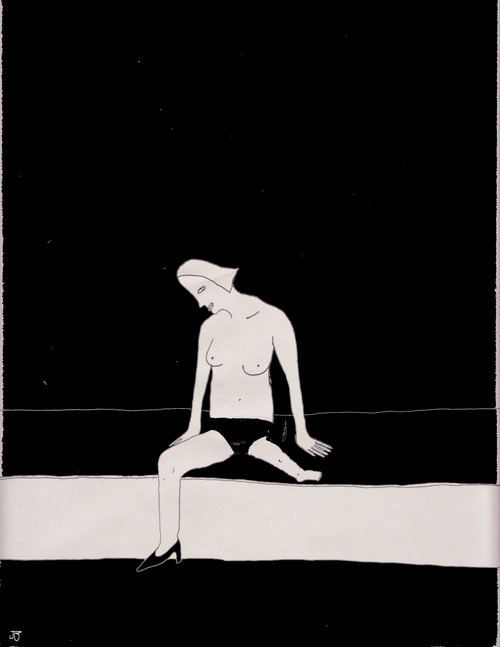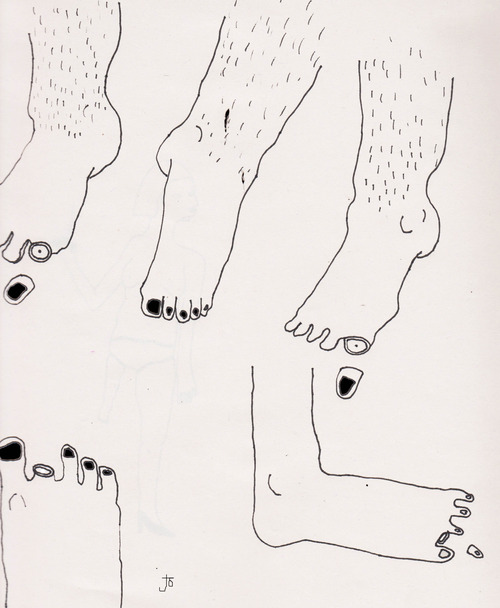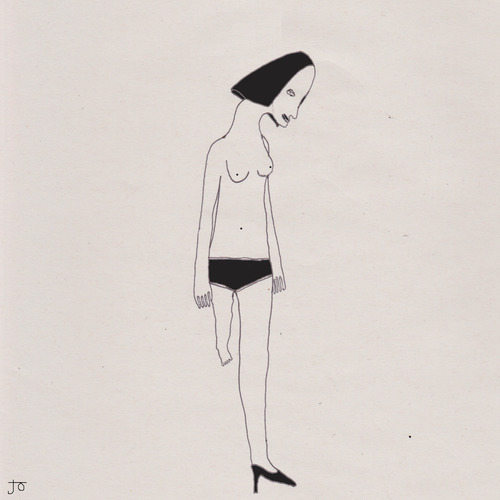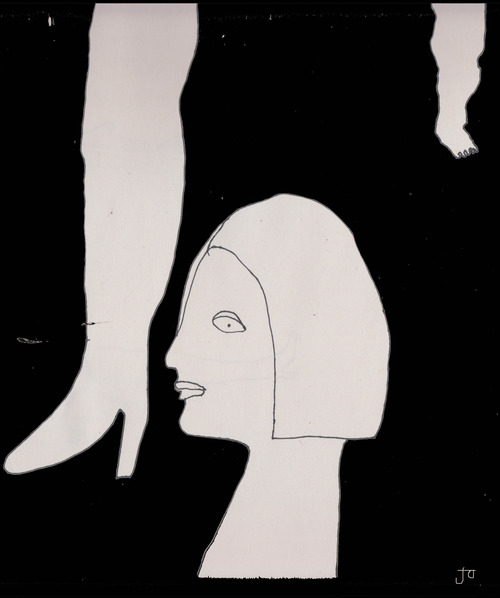Illustrations by Josephine Demme
In this series five different writers talk to one writer about five (or more) of his different books. In this first interview, Colin Winnette talks to Brian Evenson about his books Baby Leg and Dark Property.
Colin Winnette in Conversation with Brian Evenson
Brian Evenson is an incredibly kind man with eyes that could lead a cult, if he had the inclination. Instead, he writes terrifying fiction that grapples with the duplicitous nature of reality, or our interpretations of reality. Some call it literary horror. He’s written twelve books, and each is uniquely affecting, but many bleed together or interact with one another in unexpected and rewarding ways. His writing is forceful—not just the subject matter and the emotional content of the stories, but the way the letters and words sit together, the way his sentences push into you like a thumb. He is bold in the forms he’ll use, willing to end a story at the length it demands (40 pages, 120 pages, 250 pages, 2 pages) rather than stretch it too far or trim it back—so the lengths of his books vary widely from project to project. We should all be brave enough to let our stories end when they want to.
Evenson teaches at Brown University. He is the recipient of three O. Henry Awards. He has also written an expansion of the Aliens universe, under the name B.K. Evenson, and a book version of the Rob Zombie film, Lord of Salem. His newest novel, Immobility, is available from TOR Books. For this interview, we set out to talk about his books Baby Leg and Dark Property.
—Colin Winnette
I. FIFTEEN MINUTES
COLIN WINNETTE: As a prolific writer, and a generous guy, you’ve done a considerable body of interviews and conversations, most of which are available online. It’s wonderful. But my first question would be: is there something you’ve always wanted to say but haven’t had the opportunity?
BRIAN EVENSON: Well, I don’t know. At this point, I seem to have been asked almost everything, and usually I answer at least relatively truthfully, though it’s also become easy to say the same things over and over. I’ll try not to say the same things this time.
I do know that it’s become commonplace to refer to me as prolific—once someone says that, everybody does, and it’s not like I’m Thackeray or Dickens or Balzac, but I do really like to write and have been blessed with having the problem of having more ideas than I could ever possibly write about rather than a dearth of ideas.
I don’t think I spend a lot more time writing than other writers. But I do think that when I was a young writer with two young kids, I learned that whatever time I could get, even if it was just a few minutes, was valuable. I don’t spend time ramping up and ramping down like a lot of writers I know. I don’t check to see if anything is new on the Internet. I don’t have to spend time sharpening my special magical pencil made from wood taken from the deck of the Titanic. I don’t have to brew my cup of coffee and balance it just right to write. I don’t have to be writing in my precious little handmade notebook that I bought in Bolivia from the Aymara people. I don’t have to be sitting at my desk looking out at the birds in the backyard and wait for the song of the lark for inspiration to strike. Instead, if I have fifteen minutes, I write for a full fifteen minutes. I try to live my life in such a way that when those minutes come I can take advantage of them wherever I am and whatever I have to write with—computer, phone, pen, pencil, etc.—and take advantage of them fully, and I think the idea of being committed to doing that has actually, somehow, made it work.
CW: Could you talk more specifically about the relationship of your ideas to your work? What I mean is, some will say an idea motivates them to write, and what they write takes on a life of its own, so they have to abandon the original idea for whatever it’s becoming. Or, alternatively, some people write to work out an idea and consider the work finished when the motivating idea is resolved. Your work is often cyclical (Baby Leg, and to some extent, Last Days) or self-distorting (Dark Property) in a way that generates or heightens a sense of helplessness or frustration. For me, what’s often moving and terrifying about a lot of your work is that the protagonists are strong, by no means helpless in a day-to-day way, but there is always something more powerful pressing down on them or pursuing them. I read your work as existing somewhere in between the two dynamics described earlier—the books articulate an idea but the only resolution is a sense of, “Dear God, what’s next?”
BE: When I was really young, maybe four or five years old, my mother often used to say to me when I was complaining that “life is never fair.” I’m not quite sure where she got the idea that it was a good idea to tell me that, and she wasn’t at all bitter or cynical, more stoical: you accepted that life wasn’t fair and then you could get on with living it and being happy. Somehow, though, I think for me that idea extended in curious ways that she didn’t expect and probably wouldn’t have agreed with. I gradually developed an intense suspicion of what made life unfair—institutions, religions, and corporations in particular—and that somehow extended to a suspicion of what people were telling me about what life meant or how “things” were or should be.
I think it might have potentially ended there, as a kind of anarchic streak within me, but in the end, it went further to become a belief that it was impossible to ever know anything for certain, that reality itself is deceptive and self-deceptive, that the ground beneath our feet is always unstable and shifting. But at the same time, I love following the articulation of a system or a series of ideas. It doesn’t really matter to me how wrong the system or the idea is (or if I know whether it’s wrong or not) as long as I can pursue its development and processing. So, I guess I find myself most satisfied with fiction, both as a reader and as a writer, when I can build up a system with a certain amount of complexity, but then also destroy it, begin to take it apart a little.
The reinscription of the world by the mind of a paranoiac, for instance, is a lovely thing to follow, from the outside (probably not so lovely to literally live)—the imposition of one’s own will on the chaos that is the world to make sense of it. Religion does something similar (though in my opinion less interesting), as do almost all perceptions and notions of belief. But I’m particularly interested in the need—which I think at least some humans have—to articulate and follow through ideas that leave them at a quandary and unable to know what to do next. I think a lot of my narrators do that, essentially detailing the way that they’ve reached a point where all their ways of thinking have led to a dead end, where they really are trapped or, as the beginning of Last Days suggested, where knowledge or realization of what’s happening has come only too late.
CW: Do you think this distance between you and the observed articulation of a system or series of ideas, this interest in the duplicity of organized thought, is part of what drew you to fiction as your primary artistic practice? Or were you always interested in fiction, and these ideas developed over time? I ask because it seems like a medium that’s particularly well suited to the ideas you’re exploring.
BE: Very hard to know. I think those two things developed hand in hand, that thought is always innately duplicitous, at least for me. Fiction’s wonderful in that you’re building something, but really you’re building nothing—you build the impression of something. And yet, we often physically respond to narration, feel real emotions when we read: we can’t sleep because something in a book scares us, for instance, or our pulse increases. Yet there’s nothing tangible about fiction beyond the words themselves on the page. Even the sounds of the words themselves are intangible normally, since we generally don’t read out loud when we read a book. Fiction is particularly good at building up a series of illusions but also revealing them to be illusions. But I think that’s the way the mind works in general: we don’t really interact with the world. We reproduce a simplified version of the world in our head and then interact with that, with how we imagine our world. And there are moments when the world suddenly reveals itself to be different than we think it to be, but never in a way that we can think, “There, I’ve reached the bottom of things, and it’s solid.” We never get to the point where we’re sure things are solid. Or at least I never do. And yes, in my opinion fiction is particularly good at expressing that. And I’m trying with my work to make it even better at doing that.

II. ALTMANN IN BOLIVIA
CW: Dark Property and Baby Leg offered me insight into what I read as some of your primary concerns: the problems and horrors of consciousness, the unfixed nature of reality—or overlapping realities—and the relationship of these things to language. Specifically, Dark Property’s use/abuse of language and the startling/discomfiting/disturbing effects on the reader: how our sense of the reality of the story is questioned, distorted, broken, and reorganized, by the writing. And then there’s Baby Leg’s distortion of the protagonist’s consciousness (through dreams, amnesia, drug-induced states) as a way of distorting/complicating the story’s realities. The language in Baby Leg is much more direct and simple, but what it describes is complicated and uncertain. The inverse seems true of Dark Property. I’m interested in hearing your thoughts on this juxtaposition, but I’m also curious (as these books were published roughly seven years apart, Dark Property in 2002 and then Baby Leg in 2009), did your concerns shift, were you consciously attempting a new technique, or are both stories simply born of you and written as you felt and thought at the time of their creation?
BE: I feel that every new book is a new thing, and that there have been a lot of shifts over the course of my career, most of them only semi-conscious. Actually the distance between Dark Property and Baby Leg is a lot bigger than you mention, more like 15 years: Dark Property was first written in 1994 or 1995 when I was living in Utah, and was originally meant to be part of a book of three novellas that was meant to be my second book with Knopf. My editor liked the book but then left Knopf before signing the contract. One of those novellas, a fantastical piece about a Nazi in South America, I don’t think I’ve ever published. Another was a longer version of the story I published as “Blessing the Dog.” The third was Dark Property. It took me about seven years to find a publisher for it.
Dark Property seems to me a kind of limit as well as being a book. It was as far as I wanted to go in a particular direction, and came into being because of an interest in words that had dropped out of the language. I wasn’t interested in making an obscure text, but interested in seeing if I could write a text that was comprehensible and that readers could genuinely follow even if they didn’t know a certain number of the words. I was trying to replicate the pleasure that I remembered getting when, as a young kid, I would read books that were too hard for me and still really enjoy them but not always be completely sure of what exactly I’d read.
Baby Leg ended up being a different sort of thing. The title and the idea is a pretty direct reference to the ending of Jim Thompson’s amazing little novel Savage Night—which is one of my favorite noirs. But somewhere along the way I started thinking about David Goodis’ Shoot the Piano Player and there are one or two very weird nods to that as well. How I got from there to a kind of mad scientist sort of thing (if that’s what it is) I don’t know. By the time I was writing Baby Leg I was really interested in thinking about perception and overlapping realities, and the novella form opened up a lot of possibilities in that regard.
CW: Could you tell me a little more about the Nazi in South America book? A book like that, written by you, sounds incredible.
BE: It was called Altmann in Bolivia. I haven’t thought about it for years. It was written almost twenty years ago now. There’s a copy in a box somewhere, and I have a file of it on one of those old computer disks that I no longer have a machine able to read, but could probably find it. I do have a piece of it that I’d planned to publish as a short story and never did; if that’s any indication of the whole, it’s a kind of weird combination of pretty dark magic realism, Nazi-hunting, and mythology, with language that’s intensely inflected in a way not unlike Dark Property. I like that bit of it, and might try to sort my way back to the whole sometime.
Of course, there are a lot of things like that, pieces that might have been published but for whatever reason weren’t, and then, by the time I had a chance to get back to them or send them out again I’d found my work had gone in another direction, that there were other things I preferred to pursue. For instance, the now-defunct Pyx Press was preparing in the mid-1990s to do a limited edition collection of stories set in Haiti and South America, which would have been a companion piece toThe Din of Celestial Birds—around eight or so stories in a similar vein. We got as far as copy edits, I think, and then the project collapsed. Or Elimae Press was going to do a limited-edition book of seven or eight stories also published in magazines. We got as far as a mockup of the final book and then Deron Bauman had some family stuff come up and had to back away from the project. Or there’s a chapbook or two of dark but Mormon-related stories that I never pursued, including a wife-swapping story and a story that’s a kind of Mormon homage to Flannery O’Connor’s “A Good Man Is Hard to Find”, that maybe would have taken my career in a very different direction. And when I was finishing Altmann’s Tongue I was also sending around a novel manuscript called A Circular Desert that I always think I might go back to. Or there’s a complete locked room mystery that I wrote about ten years ago now called Pergolesi’s Death. Sometimes I circle back to earlier work—the collection Windeye for instance has one piece in it that’s almost twenty years old—and may do so with some of that, but I’m more interested in seeing where I’m going next than where I’ve been.

III. THE MISSING TOE
CW: Did you feel like Dark Property was at all claustrophobic? Either to write, or as an effect you may have tried for? For me, it was almost like moving through a dark tunnel with my hand pressed to a nearby wall. I mean that as a compliment.
BE: It was extremely claustrophobic to write, and I hope it’s that way for the reader as well. I tried with the rare and uncommon words to give them in a context where you could kind of guess what they meant but not know for sure, to recreate the experience you have as a kid where you’re reading something you almost understand, that might just be a little bit out of your grasp. But it took a tremendous amount of effort to figure out the balance, to have a largely transparent text with these mysterious little clots of language throughout it. The process was a challenge, and it makes it a very different book from the usual excessive and maximalist texts that such words are found in. I did it without a thesaurus, did it by collecting words that I found strange or unusual as I was working on my PhD in 18th century literature, and then thinking through possible variants of words that I thought might exist and looking them up in the Oxford English Dictionary, which often led me to new words. Or even being driven, because of sound patterns, to offer a particular word and then looking it up and finding it meant something that I hadn’t realized, but that I’d subconsciously known. That book was written more beneath the surface of my mind than anything else I’ve done. And then for me so much of the book is about the sound and rhythm of the words—when I was writing it there were passages I read aloud over and over and that still stick in my head, that still feel like they were inscribed directly on my brain.
CW: Could you quote one?
BE: There’s one sentence in the book that I repeated so many times that it still circulates in my head, and I find myself thinking about every few days or so. It just pops into my head for no reason. I think I’ve quoted it before in other interviews I’ve done about Dark Property: “The heel of his hand and the hizzen of his boot had gone thick with blood.” That’s probably my favorite sentence I’ve ever written. Or “The road ran ahead through dips and swells, through which the figures themselves ran.” Or “Blood gobbed the low rim of the missing toe.” Or “…a rough cast wall, gone swale now, past midnight.” It may be “rough-cast.” I don’t have a copy of the book here to check that they’re the same on my page as in my head, but they’re pretty close, I think. “The dead eyes flucked…” I don’t remember the rest of the sentence. If I sat for a while in a darkened room, I could call more of them up.
CW: If most of the shifts in your career were only “semi-conscious,” could you tell me about the ones that were fully conscious, or more than semi-?
BE: This is a hard question to answer. I’ve always been a big believer in chance and in letting things develop as they want to rather than forcing them. Really it’s been little things along the way. So, for instance, Paul Miller writes and asks for something for his horror-related chapbook series at Earthling Press and it gives me an excuse to do “The Brotherhood of Mutilation.” I guess there’s a conscious element in that, and I think working for particular people, particular types of presses or particular forms allows me to give myself permission to try new things. What’s been conscious, I guess, is less my particular relationship to career or genre and more a kind of attitude or philosophical stance behind the fiction as a whole. I think that’s something that’s pretty consistent even as the trappings of genre change and shift.
CW: Could you talk more about the novella form as it relates to perception and overlapping realities?
BE: I think the novella form is remarkably flexible. For me, at its best it provides the advantages of the short story and the advantages of the novel while dodging some of the problems of both. Someone, I can’t remember who, describes it as the most philosophical of forms, and I do think it’s remarkably good as a tool for exploring perception, a good length either for focusing in on the eccentricities of an individual’s perception or for contrasting two perceptions. I think, too, since it can be read in one (admittedly longish) sitting, it allows for a kind of drawing and erasing of realities that can have more impact than a short story (where it has to be done quite quickly and by inference) or a novel (where the impact can get lost or simply become different because of the time it takes to read through it). It’s a great form, probably my favorite form.

Colin Winnette’s fourth book, Coyote, (Winner of Les Figues Press’s NOS Book Contest), will be released in late 2014. His next novel, Haints Stay: A Western, will be released by Two Dollar Radio in 2015. A full list of interviews from this series can be found at colinwinnette.net.





